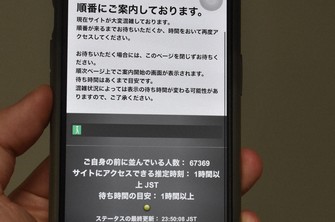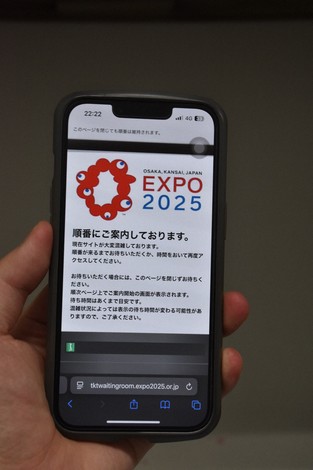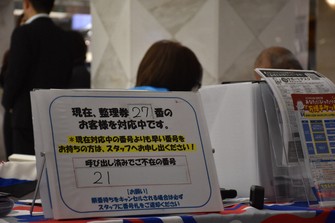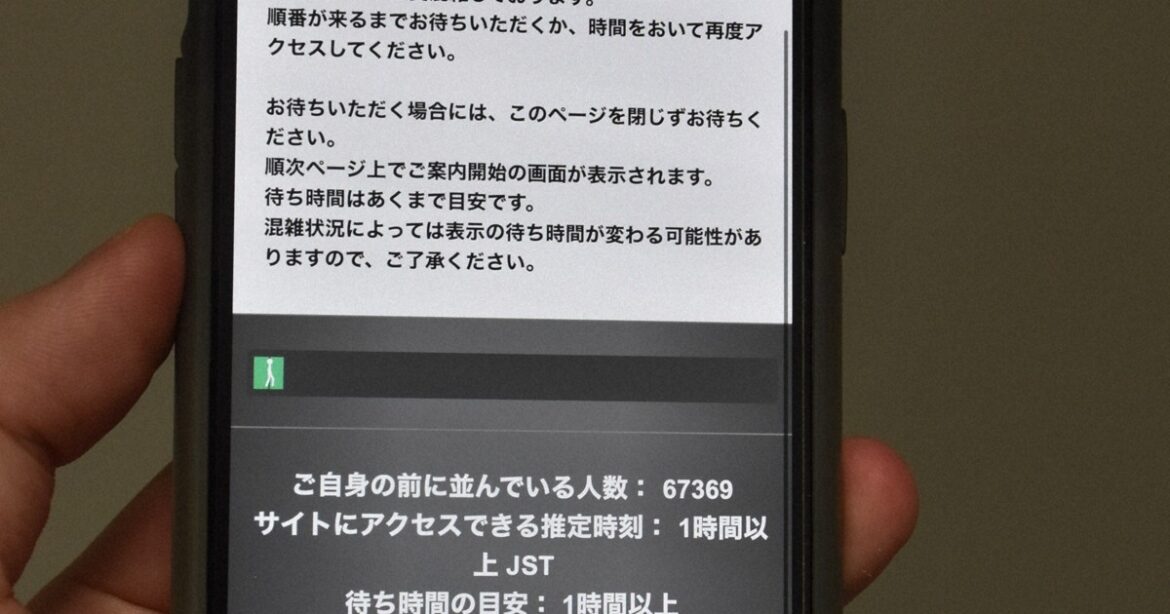
A screen of the “waiting room” of the Osaka Expo reservations site is seen after an attempt to log in after midnight, in this photo taken on May 21, 2025. (Mainichi/Tatsuya Naganuma)
OSAKA — Two months into Expo 2025 Osaka, Kansai, ticket sales have picked up, with daily visitor numbers trending upward. Every day at around midnight, the expo association’s reservation website gets flooded with people seeking available slots for reservable pavilions and events, pushing many into an online “waiting room.”
Why, despite the Expo boasting of having “no lineups,” are people queuing online?
This reporter also experienced the issue in late May. When attempting to reserve spots to see a pavilion with a friend during time off, it took about 30 minutes to log in after trying to do so around 10 p.m. However, I ended up logging out at one point, and tried to log back in close to midnight. I was then shown a message onscreen saying that I’d have to wait my turn. I was also informed that 67,369 people were ahead of me, and that it’d take over an hour.
Since the system has a feature allowing others to reserve on their behalf, I left it up to a friend who had tried to log in at around the same time. However, an error occurred, and by the time it cleared up, the pavilion we wished to see had been fully booked.

The screen of the “waiting room” for the Osaka Expo reservations site is seen after trying to log in after 10 p.m., on May 21, 2025. (Mainichi/Tatsuya Naganuma)
Lottery system in place for advance bookings, yet …
The Japan Association for the 2025 World Exposition has called the Expo a “no-wait expo,” adopting e-tickets and advance reservations for entry in principle. Visitors must obtain an Expo ID through the official website, purchase tickets and then reserve their desired date and time of entry.
As well, reservations must also be made for certain pavilions and Expo events. Drawings for pavilion slots and other attractions take place twice: two months in advance and again one week before the visitor’s scheduled Expo date.
Also, from three days prior until the morning of the day before a ticket-holder arrives, open slots can be reserved on a first-come, first-served basis, triggering users to rush online at midnight. Those failing to secure slots during this period must register for same-day vacancies upon arrival at the venue or line up on-site.
Regarding the online congestion, an association official declined to specify exact reasons or any future countermeasures, describing the issue only as “for protecting security.” However, the official mentioned that the online “waiting room” had been implemented to prevent massive waves of simultaneous site visits from overloading the system.
At a June 9 press conference, someone suggested changing the reservation process for these three-day advance bookings from a first-come, first-served system to a lottery. Hiroyuki Ishige, secretary-general of the association, responded, “We are not thinking of immediately switching to a lottery.”
Ticket sales near break-even point
Sales of Expo tickets have been picking up since it opened on April 13, accounting for around 3.75 million — or nearly 30% — of the some 13.44 million total tickets bought since sales launched in November 2023 through June 6 this year.
This total remains under 60% of the goal of 23 million, but is nearing the break-even point for operating costs, 18 million. As well, daily visitor numbers, which had been sluggish, have been trending upward, and reached a high of about 170,000 on May 31.

A sign indicating that numbered waiting tickets are being used for those at an Expo venue support desk is seen in Osaka’s Chuo Ward on May 30, 2025. (Mainichi/Tatsuya Naganuma)
Support desk visits also see heavy queuing
A growing number of visitors have been using “support desks” to assist with ticket purchases, visitor reservations and other inquiries, and as of May, Osaka’s prefectural and municipal governments had installed up to about 10 such desks near major train stations and in large commercial facilities. According to the city and prefecture’s Expo promotion bureaus, over 2,000 people per week were visiting the desks with issues related to the complicated reservations system.
A support desk in the Namba Walk underground shopping center in Osaka’s Chuo Ward was also packed with people holding inquiry tickets from the morning on. A 61-year-old woman from Saitama Prefecture bought paper tickets for the Expo through a travel agent, and has been to the venue six times. Wishing to purchase a pass for the full term, which is an electronic ticket, she came to ask about the procedure, and recalled with disappointment, “I don’t have internet in my house and I don’t have a smart phone, so they said, ‘No, you can’t.'”
Recognizing that many are having difficulty buying e-tickets, a support desk representative stated, “The bottleneck is the two-step verification required for login and other things. Responding carefully takes 20 to 30 minutes per person, and there is a limit to how many people can be served in a day.”
(Japanese original by Tatsuya Naganuma, Osaka City News Department)


AloJapan.com